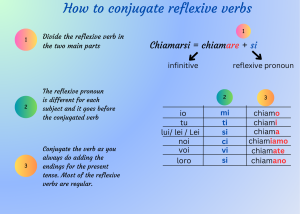G 4.2 – I verbi riflessivi e i verbi reciproci
G4.2 – I verbi riflessivi e i verbi reciproci
Reflexive verbs are verbs in which the subject performs and receives the action (for example: I wash myself). In Italian the reflexive meaning is expressed by the reflexive pronouns: mi, ti, si, ci, vi, si has shown in the chart below.
| Subject Pronoun | Reflexive Pronoun | English |
| io | mi | myself |
| tu | ti | yourself |
| lui /lei /Lei | si | himself / herself |
| noi | ci | ourselves |
| voi | vi | yourselves |
| loro / Loro | si | themselves |
How to conjugate reflexive verbs
- Divide the verb into the two main parts: Chiamarsi –> Chiamare (infinitive) + si (reflexive pronoun)
- Place he reflexive pronoun corresponding to each subject in front of the verb
- Conjugate the verb as you normally do by adding the endings for the present tense.

| Subject pronouns
(Subject pronouns are in brackets because they are often omitted in oral communication, in particular if another pronoun (ex. reflexive pronoun is used). |
alzarsi (to get up) | mettersi (to put on) | divertirsi (to enjoy oneself) |
| (io) | mi alzo | mi metto | mi diverto |
| (tu) | ti alzi | ti metti | ti diverti |
| (lui / lei / Lei) | si alza | si mette | si diverte |
| (noi) | ci alziamo | ci mettiamo | ci divertiamo |
| (voi) | vi alzate | vi mettete | vi divertite |
| (loro / Loro) | si alzano | si mettono | si divertono |
When the sentence is negative, non precedes the reflexive pronoun:
-
- Ti metti il vestito blu? – Are you putting the blue dress on?
- No, non mi metto il vestito blu. – No, I am not putting the blue dress on.
Most verbs can be used both in the reflexive and non reflexive form.
Example:
io lavo il cane –> I wash the dog
io mi lavo –> I wash myself
Most common verbs that are used in the reflexive form
| svegliarsi (to wake up) | alzarsi (to get up) | lavarsi (to wash oneself)
lavarsi i denti lavarsi i capelli lavarsi le mani |
vestirsi (to get dressed)
svestirsi / spogliarsi (to undress) |
| mettersi (to put on clothes)
togliersi (to take off clothes) |
farsi la doccia
farsi la barba |
pettinarsi (to brush / to comb ones hair) | truccarsi (to apply makeup) |
| depilarsi (to shave the body)
tagliarsi i capelli (to have a haircut) |
addormentarsi (to fall asleep) | chiamarsi (to call oneself) | allenarsi (to train) |
Some verbs are used only in the reflexive form
| sentirsi bene / male (to feel well / bad) | riposarsi (to rest) |
| annoiarsi (to get bored) | divertirsi (to have fun) |
| laurearsi (to graduate from college) | diplomarsi (to graduate from highschool) |
Reciprocal verbs
Reciprocal verbs are verbs in which the action is performed on one another or together. Since at least two people are needed to perform the action, reciprocal verbs do not have the singular form but just the plural one (noi, voi, loro).
Reciprocal verbs act like reflexive verbs, so they use the same reflexive pronouns (ci, vi, si).
Some examples:
- Noi ci salutiamo al bar -> we greet each other at the bar
- Voi vi vedete in piazza per mangiare un gelato -> You see each other in the square to eat an ice cream
- Giacomo e Filippo si riuniscono con gli amici per guardare la partita di calcio -> Giacomo and Filippo meet up with their friends to watch the soccer match
| Subject pronouns
(Subject pronouns are in brackets because they are often omitted in oral communication, in particular if another pronoun (ex. reflexive pronoun) is used). |
salutarsi
to greet each other |
vedersi
to see each other |
riunirsi
to meet each other |
| (noi) | ci salutiamo | ci vediamo | ci riuniamo |
| (voi) | vi salutate | vi vedete | vi riunite |
| (loro / Loro) | si salutano | si vedono | si riuniscono |
Most common reciprocal verbs
| aiutarsi (to help each other) | baciarsi (to kiss each other) | salutarsi (to greet each other) | riunirsi (to meet each other) |
| capirsi (to understand each other) | sposarsi (to merry each other) | incontrarsi (to meet each other) | amarsi (to love each other) |
| abbracciarsi (to hug each other) | vedersi (to see each other) | conoscersi (to know each other) | lasciarsi (to break up) |

